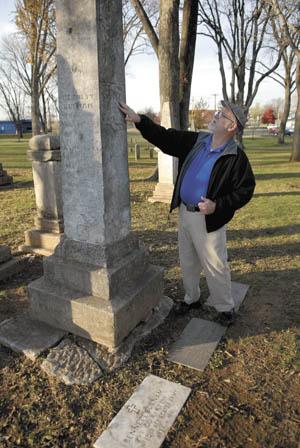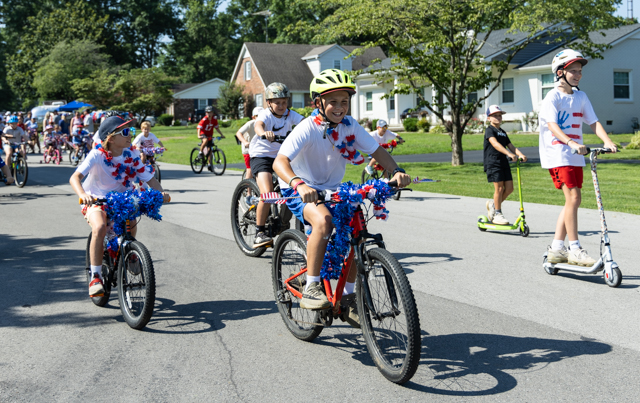This Stephen King honors fallen heroes
Published 12:00 am Monday, December 3, 2007

- Miranda Pederson/Daily NewsStephen L. King looks over a grave marker Friday at Pioneer Cemetery.
Everybody knows that Stephen King the horror author and cemeteries are a good match.
It’s no different for 53-year-old Stephen Lynn King, the dairy manager at Houchens on Louisville Road, who since 1982 has placed more than 400 military grave stones at the burial sites of veterans.
“It does me good to do this kind of work when an old vet shakes my hand,” he said. “I’ve even had them call me at my home to thank me.”
King’s work is voluntary.
He pours over microfilm, old newspaper clippings, anything he can find at the Kentucky Library and Museum at Western Kentucky University, just hoping he’ll come across an unfamiliar veteran’s name he can research and document with proof of service so he can present his facts to the Veterans Administration and have them send him a military stone to mark their grave.
“One elderly man, I found one of his ancestor’s graves,” King said. “He called around to find out who did it and called me and said, ‘thank you. I didn’t think anyone even cared.’ ”
Often King’s work, which is sometimes done at the request of a veteran’s family member, is painstaking.
He must provide proof of service through military documents to the VA and make sure he’s got his facts right before the administration will give him a stone to place.
Sometimes, he has to track down a veteran’s descendants. Often, paperwork he’s found without help from anyone is his only proof of a veteran’s service.
“He’s dedicated and he’s loyal and he’s thorough with his work,” said Glasgow’s Perry Brantley, who met King two decades ago while both were doing research about veterans at the Kentucky Library at Western Kentucky University.
King has found the graves of those who served in the Revolutionary War, War of 1812, Civil War, Spanish-American War, World War I, World War II and other conflicts.
At times, Brantley has helped King with the research.
“We’ve got to hunt and peck,” Brantley said. “Sometimes the graves are in family cemeteries that are long abandoned and you have to clean them out.”
It’s all worth it to King, whose brother, Daryl King, said Stephen L. King is “really interested in educating people as well as (honoring) the people who did fight.”
Stephen L. King was born in Murray.
His late father, Mackwayne King, was the assistant chief on the Murray Fire Department and his late mother, Barbara Jean Wilkinson King, was a nurse at Mason Memorial Hospital.
Later, Stephen L. King’s dad retired from the fire department because of heart problems and the family moved to Louisville, where Mackwayne King worked as a deputy sheriff at the Jefferson County jail and attended bartending school.
Later, Mackwayne King got a job bartending at the Holiday Inn in Bowling Green and the King family lived in Rich Pond.
Stephen L. King was an adolescent then and had long been hearing family history.
“As a child, by my grandparents there in Murray, I was schooled on genealogy,” he said. “I knew all about my family… We used to travel around to the cemeteries and I was amazed at the old gravestones.”
Learning he had relatives who fought on both sides of the Civil War especially intrigued Stephen L. King.
Knowing about a Confederate veteran ancestor who just had one arm and had been wounded and captured in the Civil War’s Atlanta campaign, started Stephen L. King thinking about all old soldiers.
“What about the men who served with him?” he said he wondered.
As a teen who attended Warren Central High School, Stephen L. King learned to research a veteran’s service.
After graduating from high school in 1973, he began attending WKU, where he was in the ROTC program, and started taking note of a lot of the veterans’ graves around Warren County.
“I tried to do something about it,” he said of researching the graves in the hope of placing military stones on them.
But he was busy with other things in those days.
“In about ’76, I quit going” to Western, he said. “I’d gotten married and started working for Houchens when I was in high school. In June of 1974 I started full-time (work at Houchens) and have been with them ever since.”
In 1979, Stephen L. King welcomed his first son, Matthew, into the world.
Three years later, he placed his first military grave stone on the resting place of a Civil War veteran in Fairview Cemetery.
“I had gotten interested in the Civil War monument at Fairview,” he said. “That was very interesting and needed a little more individual care than it was getting.”
Daryl King said his brother worked to fix up the old monument in a cemetery Stephen L. King said is the nicest in which he’s worked.
Since then, Stephen L. King has never stopped liking to contribute when it comes to the military marking of veteran’s graves, even when the research work is tedious.
“Do you know how many John Smiths lived in Warren County in 1890?” he asked.
Recently, Stephen L. King placed three military grave stones in Russellville.
Through the years, he’s placed them in surrounding counties, including, with permission, in Mammoth Cave National Park. He’s also placed a stone in Tennessee.
“One time I had 20 stones delivered” at home, Stephen L. King said. “The guy (who delivered them) was beside himself. He said, ‘what happened?’ ”
Recently, Stephen L. King said, he’s “slowed down” his grave stone-placing work “quite a bit because it’s very hard work.”
But he wishes he could do more.
“If someone serves in the military, regardless of what war … people need to know,” he said. “It’s proper to let them rest with dignity, have something people can visit … It’s just a drop in the bucket. You wouldn’t believe the graves that are not marked. It’s hard for one man to do it all, so I take my time.”
Stephen L. King is also not doing as many Civil War re-enactments as he used to.
Years ago, he re-enacted at Gettysburg and through the years he’s portrayed both Confederate and Union soldiers at living history events in several states.
“What I really enjoy about re-enactment is it kind of gives me an idea about what the soldiers went through,” he said. “I’m not being shot at … but I’ve been to re-enactments where the weather was so cold. I had to do guard duty one night and stand in the rain at attention. They say if you don’t want to play, go home. It’s hard to go home when you’re 1,300 miles away.”
Intense heat also lends some reality to re-enactments, he said.
“Do you know what it’s like marching in 100-degree temperatures in a wool uniform?” he asked. “Your canteen is your best friend.”
While placing grave stones and re-enacting have been two of Stephen L. King’s biggest hobbies, he also collects L&N Railroad memorabilia and black powder guns.
He first hunted with black powder as a kid, in the days when he’d also sit by the railroad tracks and watch the trains go by.
“I got many a whipping over that,” he said of his train-watching. But “even today, I’ll sit and watch one.”
Now, the former volunteer firefighter for the Richardsville and Gott communities, lives in Plum Springs and is writing a history of Rich Pond.
“I should have made my life out of it,” he said of history. “I think I would have loved to have done that.”
But the man who attends church at Beaver Dam Chapel in Edmonson County doesn’t regret the way he’s lived his life.
“I don’t regret anything,” he said. “I’ve worked hard and history is my hobby. History is what I do instead of play golf.”






